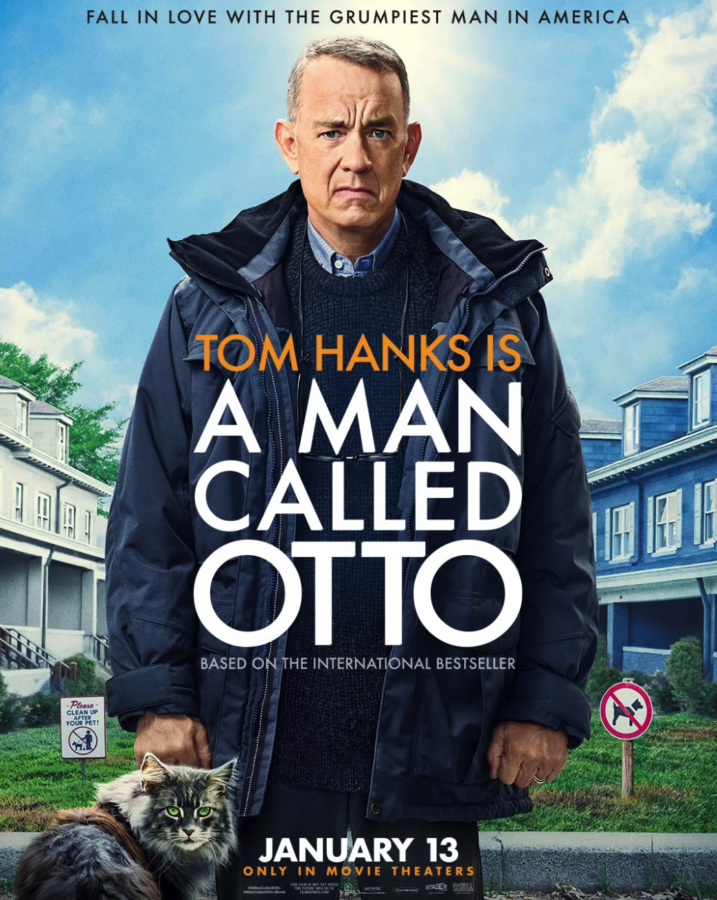“A Man Called Otto” outshines the original
IMDb
“A Man Called Otto” follows a grumpy old curmudgeon, Otto, as he deals with the grief of losing his wife with the help of the family next door.
January 30, 2023
In today’s rapidly-paced world, some people just can’t live in peace. And some can’t die in peace either.
Cantankerous old Otto Anderson grumbles his way into our hearts in “A Man Called Otto,” a remake from Sony Pictures of the Oscar-nominated Swedish film “A Man Called Ove.” The movie, directed by Marc Forster and released Jan. 13, is based off of Swedish author Fredrik Backman’s novel “En man som heter Ove.” As the adaptation of an adaptation, “A Man Called Otto” has high standards to live up to, but it succeeds in winning over an American audience with heartfelt portrayals of love and grief amid a charmingly comedic setting.
At first glance, recently retired Otto (Tom Hanks) comes off as a grumpy curmudgeon. And he is, but for good reason: people nowadays are incompetent idiots, his neighborhood is getting destroyed by money-guzzling corporations and he’s consumed with grief after the loss of his wife, Sonya (Rachel Keller). Feeling purposeless in the wake of her death, Otto resolves to join her. But when a new family moves in, their boisterous antics keep foiling his plans, pushing back his departure date until he realizes that there might still be something to live for after all.
It’s remarkable how convincingly Hanks, otherwise known as “the gentleman of Hollywood”, portrays a grouchy old man exasperated with the world around him. Once he’s donned thick sweaters and an ever-present frown, Hanks embodies Otto’s grumpiness, successfully breaking away from his other, more cheerful roles in comedies like “Forrest Gump” and “Sleepless in Seattle.” For longtime fans of Hanks, the dramatic difference in personality between his previous characters and Otto make this movie a unique watch.
Otto’s irritable attitude is somewhat tamed by Marisol (Mariana Treviño), a pregnant woman whose family has just moved in, who instantly hits it off with Otto. In many ways, her sharp-tongued retorts match his, and she manages to thaw him with her warm behavior and endless supply of Latin American cuisine. Most importantly, Marisol makes Otto feel needed, deftly pushing him towards recovery without insulting him. Almost as soon as she moves in next door, she takes on the role of the daughter he never had.
Forster’s adaptation successfully tackles the transition from a Swedish to an American audience with a series of name changes: “Ove” becomes “Otto”, he drives a Chevy instead of a Saab and suburban Sweden is now Pittsburgh, Pennsylvania. Yet the heart of the story remains universally touching: there are reasons to keep living, even when all hope seems lost, even when it seems like you have no purpose.
Suffused with sentiment, “A Man Called Otto” is a difficult movie to watch dry-eyed, but its lighter moments will have you laughing through your tears. Backman’s humorous writing style translates seamlessly in the fast-paced film. As the narrative swings between Otto’s suicide attempts and his comedic interactions with neighbors, it could be easy to get tonal whiplash, but nuanced and effective acting keeps the emotions stable.
Critics often praise dramatic, emotional acting with unrestrained rage or sadness. But in “A Man Called Otto,” the actors beautifully carry out the opposite. The film’s characters deal with a lot of suppressed emotion, which the cast encapsulates perfectly in their quiet-yet-impactful style. There are no jubilant cheers or violent outbursts of rage. Instead, there are rare, hidden smiles from Otto and quiet whimpers of worry from Marisol that leave the audience devastated. You know a movie is special when the loudest sobbing comes not from the screen, but from the audience.
Thanks to the talented cast, emotional moments hit harder with wordless simplicity. In fact, the film outshines the book through its creative reinvention of its source text. A notable example is the series of flashbacks portraying Otto’s life with Sonya, which spans decades from their meet-cute to Sonya’s death. In the novel, each flashback was its own separate chapter, removed from present-day action. “A Man Called Otto” weaves these scenes into poignant moments throughout the course of the present-day narrative, as the older Otto wanders through his memories and fondly recalls the words of his younger self (Truman Hanks). Softly framed with nostalgic music, these flashbacks constantly intertwine with Otto’s present – he sees Sonya’s books and remembers building a shelf for her, or walks through their home and imagines her beside him. It’s a heart-wrenching portrayal of how grief follows you everywhere, manifesting in every part of your life.
From the tasteful mix of comedy and gravity to the intricate relationship building, “A Man Called Otto” simultaneously proves to be heart-warming and heart-wrenching, reminding the audience why the story was popular enough to be adapted to screens around the world twice.
And as if you didn’t already have enough reason to watch this movie, there’s also an adorable cat. Go buy your tickets – just remember to bring a supply of tissues with you.







